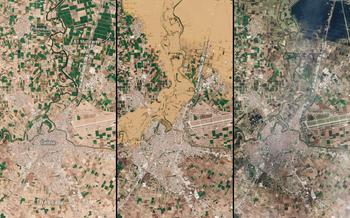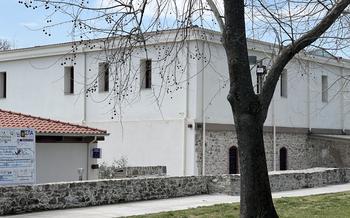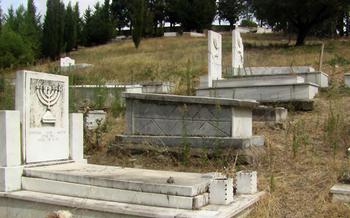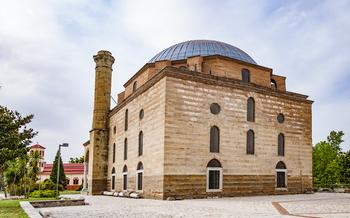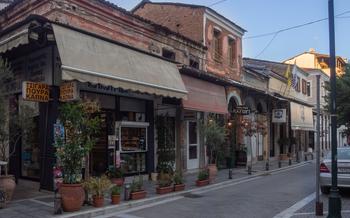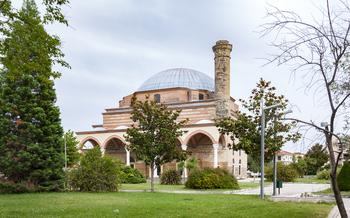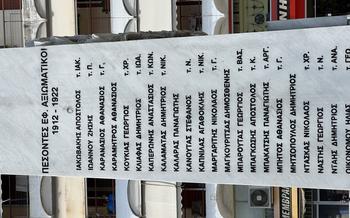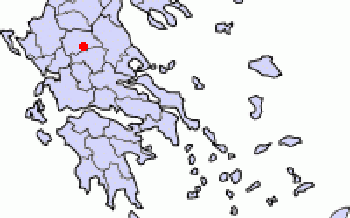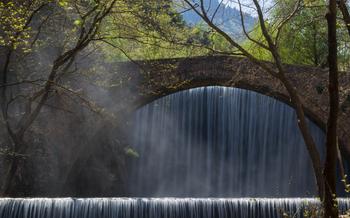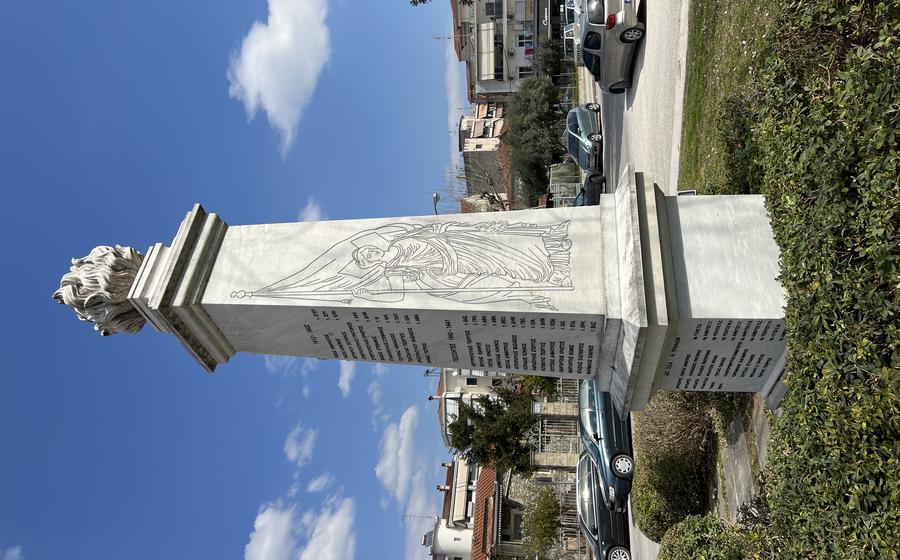
Meteora Museum of Natural History & Mushroom Museum
- Meteora Museum of Natural History: A Journey Through Time and Nature
- Mushroom Museum
- Significance of the Meteora Region
- Natural History Exhibits
- Mycological Collection
- Guided Tours
- Educational Programs
- Biodiversity Conservation
- Scientific Research
- Community Involvement
- Visitor Amenities
- Photography Opportunities
- Picnics and Outdoor Activities
- Visitor Tips
- Insider Tip
Meteora Museum of Natural History: A Journey Through Time and Nature
Established in 2018, the Meteora Museum of Natural History stands as a testament to the region's rich biodiversity and geological heritage. Located in the heart of Trikala, the museum offers visitors an immersive and interactive experience that brings the wonders of the natural world to life.
Housed in a modern and spacious building, the museum is easily accessible by car or public transportation. Visitors can find the museum at 2 Vasilissis Olgas Street, just a short walk from the city center. For inquiries, the museum can be reached at (0030) 24310 29245 or via email at [email protected].
Admission to the museum is affordable, with tickets priced at 5 euros for adults, 3 euros for students and seniors, and free for children under 6 years old. The museum's doors are open from Tuesday to Sunday, from 9 am to 5 pm. Guided tours are available in multiple languages upon request and are led by knowledgeable and enthusiastic museum guides who bring the exhibits to life with their insights and expertise.
Mushroom Museum
The Mushroom Museum in Trikala, Greece, is a unique and fascinating institution dedicated to the world of mushrooms and fungi. Established in 2005, the museum houses an extensive and diverse collection of mushrooms, representing a significant portion of the region's rich mycological heritage.
The museum's exhibits showcase a wide variety of mushrooms, from common edible species to rare and exotic varieties. Each specimen is carefully identified and displayed, accompanied by detailed descriptions and scientific classifications. Visitors can learn about the biology and ecology of mushrooms, their role in the environment, and their importance for human health and nutrition.
One of the highlights of the museum is the interactive display on mushroom cultivation. Visitors can observe different stages of mushroom growth and learn about the techniques used to cultivate mushrooms for food and medicinal purposes. The museum also hosts regular workshops and seminars on mushroom identification, mushroom cooking, and mushroom-based crafts.
Significance of the Meteora Region
The Meteora region stands as a testament to the extraordinary power of nature and its ability to shape the landscape. Its towering rock formations, sculpted by millions of years of erosion, create a breathtaking panorama that has captivated visitors for centuries. These unique geological features, known as meteora, are composed of sandstone and conglomerate, formed from ancient river deposits that were subsequently uplifted and weathered. The result is a landscape of sheer cliffs, deep gorges, and hidden caves that has become a symbol of the region.
In recognition of its outstanding natural beauty and cultural significance, the Meteora region was designated a UNESCO World Heritage Site in 198This prestigious status acknowledges the region's importance as a unique geological formation and its role in preserving a rich cultural heritage. The monasteries, built atop the towering rock pillars, stand as testaments to the ingenuity and faith of those who sought refuge and spiritual enlightenment in this extraordinary landscape.
The Meteora region is also recognized for its exceptional biodiversity, harboring a wide variety of plant and animal species. The diverse habitats, ranging from rocky cliffs to dense forests, provide a haven for numerous threatened and endangered species. The region's unique flora and fauna contribute to its ecological significance, making it a valuable site for scientific research and conservation efforts.
Moreover, the Meteora region plays a crucial role in promoting sustainable tourism and education. By showcasing the region's natural wonders and cultural heritage, the museums and educational programs contribute to raising awareness about the importance of conservation and responsible travel. Visitors are encouraged to explore the region responsibly, respecting the delicate ecosystem and supporting local communities. The Meteora region thus serves as an inspiration for sustainable tourism practices and environmental stewardship, demonstrating how natural and cultural heritage can coexist harmoniously.
Natural History Exhibits
The Meteora Museum of Natural History boasts a diverse array of natural history exhibits, designed to engage and educate visitors of all ages. Interactive displays and multimedia presentations bring the wonders of the natural world to life, allowing visitors to explore the unique ecosystems and biodiversity of the Meteora region. Fossil enthusiasts will marvel at the impressive collection of fossils, including ancient marine creatures, dinosaur bones, and petrified plant remains. The museum also features an extensive display of minerals and geological specimens, showcasing the diverse rock formations and geological processes that have shaped the Meteora landscape. Dioramas depicting local ecosystems, complete with life-like models of plants and animals, provide a glimpse into the intricate relationships between organisms and their environment. Educational resources, such as interactive touch screens and information panels, enhance the visitor experience, making the museum an ideal destination for students, families, and anyone interested in the natural history of the Meteora region.
Mycological Collection
The Mushroom Museum at Meteora boasts an extensive collection of mushrooms and fungi, representing the rich diversity of the region's natural environment. Visitors can marvel at a wide range of specimens, from common edible mushrooms to rare and exotic species. Each mushroom is meticulously labeled with its scientific name, providing valuable insights into its classification and characteristics. Detailed descriptions accompany the specimens, offering information about their habitat, edibility, and ecological significance. Interactive displays and multimedia presentations further enhance the learning experience, allowing visitors to explore the fascinating world of mycology in a captivating and engaging manner.
Guided Tours
Guided tours are available at the Meteora Museum of Natural History and the Mushroom Museum, providing visitors with an in-depth exploration of the exhibits. Led by experienced museum guides and naturalists, these tours offer expert explanations and insights into the fascinating world of natural history and mycology.
During the tours, visitors can delve deeper into the museum's collections, learning about the geological formations of the Meteora region, the diverse species of mushrooms and fungi, and their ecological significance. Guides share captivating stories and anecdotes, bringing the exhibits to life and fostering a sense of wonder and appreciation for the natural world.
Custom tours are also available for groups and schools, tailored to specific interests and educational requirements. These tours provide an immersive and interactive learning experience, allowing students to engage with the exhibits and ask questions directly to the museum's experts.
Whether you're a nature enthusiast, a student, or simply curious about the wonders of the natural world, the guided tours at the Meteora Museum of Natural History and the Mushroom Museum offer a unique and enriching experience.
Educational Programs
The Meteora Museum of Natural History and Mushroom Museum offer a range of educational programs designed to engage and inspire visitors of all ages. These programs include:
-
Workshops and Seminars: The museums regularly host workshops and seminars on various topics related to natural history and mycology. These events are led by experts in the field and provide participants with hands-on experience and in-depth knowledge.
-
School Programs: The museums offer educational programs specifically tailored for school groups of all ages. These programs align with school curricula and provide students with an interactive and engaging learning experience. Field trips to the museums are also available, allowing students to explore the exhibits and participate in hands-on activities.
-
Outreach Programs: The museums conduct outreach programs to engage with local communities and promote awareness about natural history and conservation. These programs include presentations, workshops, and exhibitions in schools, community centers, and other public venues.
-
Collaboration with Universities and Research Institutions: The museums collaborate with universities and research institutions to promote scientific research and education. This collaboration includes joint research projects, student internships, and the sharing of resources and expertise.
Biodiversity Conservation
The Meteora Museum of Natural History and Mushroom Museum play a crucial role in raising awareness about biodiversity and the importance of its conservation. Through interactive exhibits, educational programs, and outreach initiatives, the museums aim to inspire visitors to become stewards of the natural world.
The museums actively participate in conservation projects and initiatives, working closely with local communities, environmental organizations, and government agencies. They conduct research on endangered species and habitats, contributing to the development of conservation strategies. By promoting sustainable practices and ecotourism, the museums encourage visitors to minimize their impact on the environment and support local conservation efforts.
Scientific Research
The Meteora Museum of Natural History and Mushroom Museum are not just repositories of knowledge; they are also active participants in the advancement of scientific research. The museum collaborates with scientists and researchers from around the world, facilitating ongoing studies on the natural history of the Meteora region. These studies encompass a wide range of topics, including biodiversity surveys, ecological assessments, and geological investigations. The museum's extensive collection of specimens and data provides a valuable resource for researchers, enabling them to gain insights into the unique ecosystems and geological formations of the region. The museum also contributes to scientific publications and conferences, sharing its research findings with the broader scientific community. Through these collaborations and research initiatives, the museum plays a vital role in expanding our understanding of the natural world and contributing to the global body of scientific knowledge.
Community Involvement
The Meteora Museum of Natural History and Mushroom Museum are deeply committed to fostering a sense of community involvement and engagement. Through various outreach programs, the museums actively collaborate with local residents, businesses, and organizations to promote cultural heritage, environmental conservation, and sustainable tourism.
The museums regularly host workshops, seminars, and educational events that are open to the public, providing opportunities for locals to learn about and appreciate the unique natural and cultural heritage of the Meteora region. These events often feature guest speakers, naturalists, and experts who share their knowledge and insights on topics related to geology, mycology, and ecology.
The museums also work closely with local schools and educational institutions to develop educational programs and field trips that bring students into the museums and surrounding natural areas. These programs aim to inspire the next generation of scientists, conservationists, and nature enthusiasts by providing hands-on learning experiences and fostering a love for the natural world.
Furthermore, the museums actively support local businesses and tourism initiatives, recognizing the vital role that tourism plays in the economic and cultural vitality of the region. They collaborate with local tour operators, hotels, and restaurants to promote sustainable tourism practices and ensure that visitors have a positive and enriching experience while respecting the environment and local traditions.
By engaging with the local community, the Meteora Museum of Natural History and Mushroom Museum strive to foster a sense of pride and ownership among residents, promoting the preservation and appreciation of the region's natural and cultural treasures.
Visitor Amenities
The Meteora Museum of Natural History and Mushroom Museum offer a range of visitor amenities to ensure a comfortable and enjoyable experience. A well-stocked gift shop provides a variety of souvenirs and educational materials, allowing visitors to take home a piece of their museum experience. Whether you're a bookworm or a souvenir hunter, you're sure to find something to your liking. For those in need of refreshments, a cozy cafe or snack bar offers a selection of light meals and beverages, providing a perfect opportunity to refuel and recharge. Convenient restrooms and baby changing facilities cater to the needs of families and visitors of all ages. Additionally, the museums are wheelchair accessible, ensuring that everyone has the chance to explore and learn.
Photography Opportunities
The Meteora Museum of Natural History & Mushroom Museum offers a wealth of photography opportunities for visitors of all skill levels. The stunning views of the Meteora monasteries and the surrounding landscape provide a breathtaking backdrop for your shots. Take advantage of the unique rock formations and geological features to capture close-up images that showcase the beauty and diversity of the natural world. Macro photography enthusiasts will delight in the opportunity to photograph the wide variety of mushrooms and fungi on display. Remember to practice ethical photography principles by respecting the privacy of other visitors and the integrity of the exhibits.
Picnics and Outdoor Activities
The Meteora Museum of Natural History and Mushroom Museum offer a unique opportunity to combine indoor exploration with outdoor activities. Visitors can enjoy a picnic lunch in the designated areas within the museum grounds, surrounded by stunning natural scenery. The museum also boasts hiking trails and nature walks that wind through the surrounding countryside, providing opportunities for visitors to explore the region's unique geological formations, spot wildlife, and enjoy the fresh air. Birdwatching enthusiasts can keep an eye out for a variety of bird species that inhabit the area, including eagles, hawks, and vultures. For a truly immersive experience, visitors can combine a museum visit with a hike or nature walk, creating a memorable and educational day out.
Visitor Tips
To make the most of your visit to the Meteora Museum of Natural History and the Mushroom Museum, here are a few tips to keep in mind:
- Plan your visit during the shoulder seasons (spring or fall) to avoid the summer crowds and enjoy milder weather.
- Wear comfortable shoes for walking and exploring the museum grounds, as there is a lot of walking involved.
- Bring a camera to capture the stunning scenery and exhibits, especially if you are interested in photography.
- Allow sufficient time to explore both museums, as there is a lot to see and learn. Set aside at least half a day or more, depending on your interests.
- If you have any questions or need assistance during your visit, don't hesitate to ask the museum staff. They are friendly and knowledgeable, and they are always happy to help.
Insider Tip
For an even more immersive and enriching experience, be sure to ask the museum staff about special events, workshops, or guided tours that may not be widely advertised. These unique offerings provide an opportunity to delve deeper into the natural history and mycology of the Meteora region, with expert insights and hands-on activities.
Additionally, checking the museum's website or social media pages before your visit is highly recommended. This will ensure that you are aware of any new exhibits, programs, or events that may have been recently added. Stay updated and make the most of your visit to the Meteora Museum of Natural History and Mushroom Museum!
